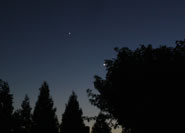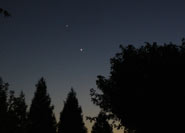| August 28, 2005 |
August 29, 2005 |

|
August 30, 2005 |

|
It’s hard to get them framed the same way every night, but I’m trying to keep Jupiter (the fainter one to the upper left) more-or-less over that one medium-tall tree. As you can see, every night they get closer!
OK, now that you’ve had some actual astronomy, let’s move on to the antiscience, shall we?
Astrology is funny. Here is something which does not work, will not work, cannot be shown to work, can be shown not to work, and has no reason to work.
Yet, people believe in it.
I needn’t go into details here, since I’ve already written a page debunking it with all the detail you need. The bottom lines are that 1) there is no force that can work as astrology claims, 2) the claims of a force used by astrologers are internally inconsistent, and 3) totally ignoring any existing or non-existing force, tests have still shown that astrology doesn’t work.
Still, astrologers aren’t exactly starving. Sometimes it seems like there are 5 astrologers for every man, woman and child on Earth. They’re like bacteria, or those slugs in the garden that keep eating my roses.
Here’s an interesting question for anyone reading this who thinks astrology works (not likely, but I’m posing a thought question). Astrologers claim they can predict your future, or your personality type, or whatever, based on the position of the planets. They claim they can do this with great accuracy; 80-90% is not an uncommon number used by them. Every planet is important, from Mercury to Pluto. So the question is this: how come astrologers have never, not once, accurately predicted a previously unknown planet?
Astronomers (the scientists, the ones who have a reality-based existence) have recently discovered a largish object out past Pluto, and it’s definitely bigger than Pluto. Why didn’t astrologers predict it? Why didn’t they say, “You know, my predictions are always off by a bit. I bet there must be another planet out there, at such-and-such a distance and in this-and-that constellation.” It seems like they’d notice after all these years that their predictions are off.
But they don’t. Like a tick or some parasite sitting on a blade of grass, they simply wait for real scientists to discover a new planet, and latch onto it like they knew it all along.
I made this point as clearly as I could to a New York Times reporter last week, for a report she was doing on how the new “planet” affects astrologers (free registration required to read it). Unfortunately, despite my giving her about a dozen juicy sound bites, she only used one, and it was a little lame.
Still, my point is relevant. She even says:
If [the newly discovered object] is a 10th planet, astrologers say it may have a profound influence over people’s lives, and thus on the forecasts astrologers make.
Let me put this very simply: if its effect may be profound, why didn’t they notice it before?
It gets funnier.
But its potency cannot be discerned until perhaps several years after the astronomical debate is settled, when astronomers have had time to chart its orbit. So astrologers are not inclined to do anything hasty. There will be no tearing up of charts, no hurriedly penciling in a new planet and certainly no crossing out of Pluto, a body that many astrologers hold near and dear.
On the contrary, astrologers seem to have reached an unspoken consensus to take a wait-and-see approach. Wait and see if there is a 10th planet.
What difference does it make if astronomers call it a planet or not? It is what it is, and it doesn’t care what we call it. It sounds like they’re saying that if a group of pointy-chinned astronomers meet in a room somewhere, and decide to indeed call this thing a planet, suddenly astrologers will have to include it in their charts. But if only black smoke appears, astrologers can rest easy knowing their horoscopes have been good all along.
Well, you can’t reasons someone out of a position they didn’t reason themselves into. Case in point:
Leigh Oswald, an astrologer in London, said unknown forces may determine when scientists discover new planets. “A planet is discovered when it’s appropriate for humanity to understand it,” she said. “In other words, when we are ready for it.”
Oh, barf. Unknown forces. Puh-leeze. It takes quite known forces: it takes time, it takes patience, it takes a good telescope and detector, and it takes science. Astrologers can sit in their parlors and gaze into whatever passes for their crystal balls, and the Universe will end before they ever make a single discovery. Except, of course, that there’s a sucker born every minute… and if that birth minute is known, there’ll be plenty of astrologers willing to cast a horoscope based on it.

